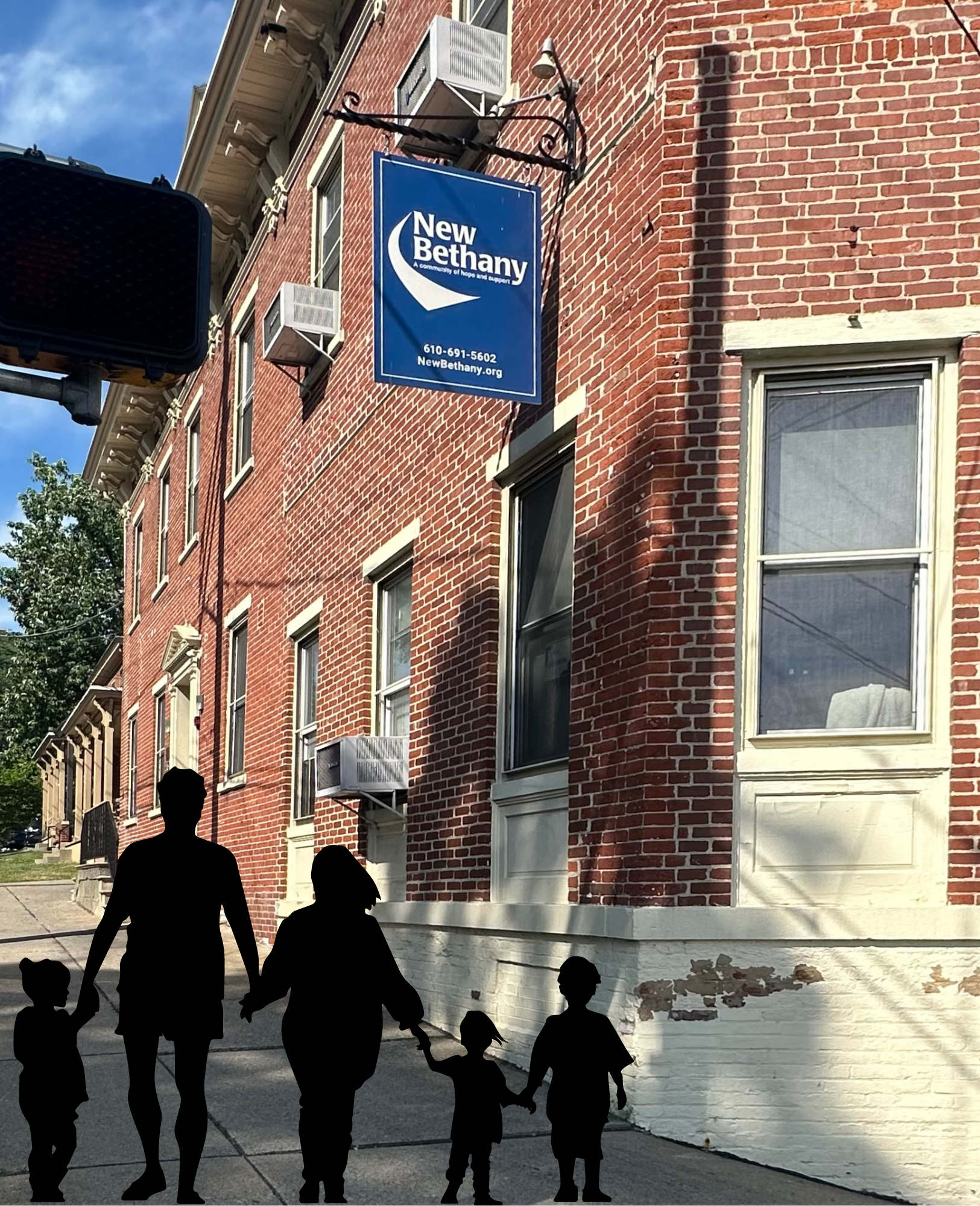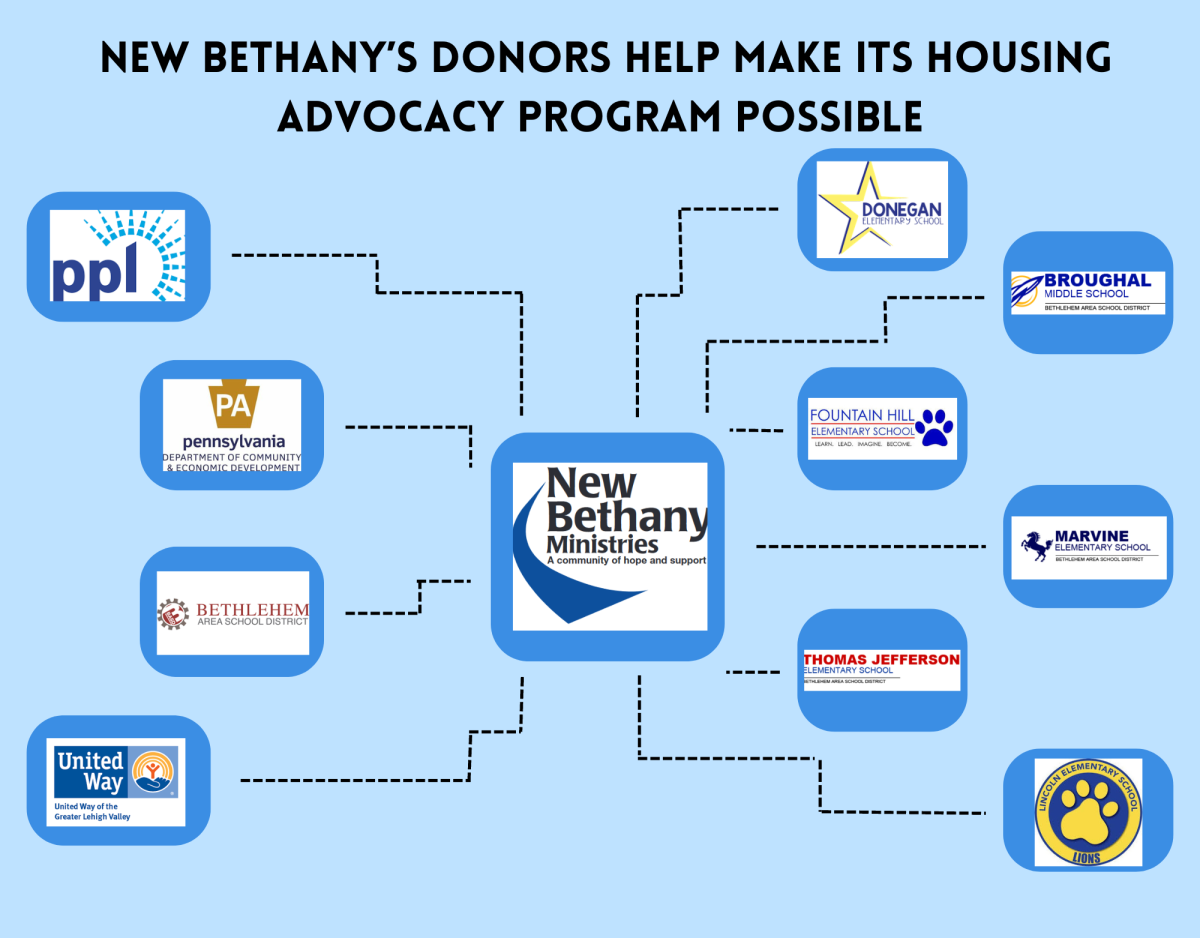For many, home is a place where stories are exchanged at the kitchen table, where refrigerators turn into art exhibits and couch cushions transform into secret forts. Home can be the smell of pancakes in the morning or a little sister’s laugh echoing down the hall. However, a lack of affordable housing has made this experience a struggle for nearly 47% of households in Pennsylvania’s Lehigh Valley.
As disparities increase between wages and the cost of homes, growing cities such as Bethlehem experience the worst of this issue.
“Rents across the Lehigh Valley have continuously been on the rise since after the pandemic, causing a housing affordability crisis,” said Dr. Cattima Millsap, Social Services Director at New Bethany Ministries. “Many residents are on the verge of eviction and entering homelessness for the first time ever.”
In response to these hardships, New Bethany Ministries, a local nonprofit, is taking a unique approach to combating housing affordability issues: they’re going straight to students to help entire families. In 2021, the nonprofit launched a new program that connects Bethlehem Area School District elementary schools with trained housing advocates. These housing advocates work with Bethlehem Area administrators and counselors to identify students struggling with housing insecurity, meet with students’ families, and help to reach solutions such as providing assistance finding affordable housing.
Another key feature of New Bethany’s housing advocates program is its commitment to breaking language barriers. Many advocates are also fluent in Spanish, enabling them to serve Bethlehem Area’s linguistically diverse student population.
This program isn’t a temporary fix, it’s a systemic solution to a pervasive problem. Counselors are helping the parents find housing, but also educating students, so the next generation will be equipped with the tools and knowledge to make smart housing choices.
New Bethany takes action
Founded in 1985, New Bethany Ministries has played an integral part in the Bethlehem community for many years. A commitment to faith has long driven the ministry’s focus on relieving poverty. New Bethany was originally created by representatives from different religious backgrounds, united in their mission to help others. Today, New Bethany provides Bethlehem with resources such as soup kitchens and thrift shops.
Currently, New Bethany Ministries is the only nonprofit in the area with an on-site housing assistance program in elementary and middle schools. Through this program, New Bethany representatives take the stress off of school counselors by directly connecting families in need with the nonprofit’s resources. The nonprofit provides everything from transportation to temporary emergency housing.
“Bethlehem Area School District staff and the housing advocate work in unison to brainstorm identifiable resources and options that are aligned to families’ current needs and situations in an effort to prevent any disruptions and offer immediate resolutions,” Millsap said.
Since its start, New Bethany’s housing advocacy initiative has experienced remarkable growth. The program first started with a grant from the United Way of the Greater Lehigh Valley, placing advocates in three Bethlehem Area elementary schools. Now the nonprofit offers housing assistance at six different schools: Donegan Elementary School, Broughal Middle School, Fountain Hill Elementary School, Marvine Elementary School, Thomas Jefferson Elementary School, and Lincoln Elementary School. The program’s funding has also expanded, partnering with local donors such as PPL Electric, the Pennsylvania Neighborhood Assistance Program, and Bethlehem Area School District.
An unstable home environment is one of the worst roadblocks to an education. The program’s expansion has allowed it to reach more families, with its services available to more than 2,000 students.
One success story of the program was a mother of four children who applied for rental and utility assistance with the help of New Bethany and her school’s housing advocate. After falling behind on her rent because of her husband’s multiple incarcerations, this mom was terrified of being evicted and losing access to utilities such as water and power. She felt powerless in her situation as she was unable to get a job without money for daycare. Thankfully, the director of social services at New Bethany along with one of their housing advocates met with her to brainstorm solutions to her situation. New Bethany was able to cover the cost of her rent and utilities until she got back on her feet.
However, it is not always easy to identify students in need of housing assistance. Due to the stigma surrounding housing insecurity, many parents and kids are ashamed to ask for help. To encourage families in need to reach out, Bethlehem Area elementary schools prioritize discreet methods of contact.
Mrs. Julissa Jimenez, the principal at Marvine Elementary, is proud of the privacy and respect her school shows students and their families.
“Instead of having struggling families reach out to us with their crisis, we post a QR code on our school communication site where parents can privately sign up for a meeting on their own time at their availability,” Jimenez said. “When needed, we provided a space in the school where families could privately meet with the New Bethany housing advocate.”
In 2022, the nonprofit hired three new housing advocates who are all fluent in Spanish. Housing advocates also use Language Line, a leading provider of online translators to accommodate families who speak a language other than English or Spanish. During a difficult transitional period, families experiencing housing instability need to feel comfortable with the organizations helping them.
New Bethany’s approach helps the nonprofit tackle the systemic issues behind the housing crisis. People of color in the Lehigh Valley are more likely to face housing affordability issues, with 59% of Black and Latino renters spending more than 30% of their yearly income on rent according to the County Fact Sheet from the Housing Alliance of Pennsylvania. Experts say that spending more than 30% of pay on housing is considered unaffordable. By eliminating language barriers, and treating all clients with respect, housing advocates can dismantle obstacles impeding marginalized groups’ path to affordable housing.
Bethlehem landlord Linda Villani has worked with the charity in the past when her own tenants needed housing assistance.
“They will treat everybody with respect,” Villani said. “They’re the kindest people I have ever dealt with. Ever. They are compassionate and sincere and they truly help these people.”
The root of the issue
The conditions that led to the creation of New Bethany in the ‘80s mirror the issues of the community today. New Bethany was formed after a series of layoffs at Bethlehem Steel, a steel production company headquartered in Bethlehem. More recently, unemployment rates caused by the COVID-19 pandemic have made New Bethany’s resources imperative to the well-being of Bethlehem residents. During the height of rising unemployment rates during the pandemic, as many as 16.6% of Lehigh Valley workers were unemployed.
Past unemployment rates have specifically impacted low-wage workers. This, in turn, has added to the crisis in home affordability issues. Low-wage workers were affected more so than other employees because their businesses were forced to shut down during the pandemic. The displacement of low-wage workers explains why the growth of jobs for middle-wage and high-wage workers bounced back quickly and these lower-paid jobs did not. In some cases, these jobs never re-emerged after the pandemic because financial burdens drove numerous small businesses to bankruptcy.
Multiple factors have hindered low-wage workers’ ability to rebound from widespread unemployment in Bethlehem and find affordable housing:
- Lacking growth of low-wage jobs
According to the study Housing Affordability in Pennsylvania During and After the COVID-19 Pandemic from Keystone Research in 2022, the number of low-wage jobs in Pennsylvania persisted at 20% below pre-pandemic levels while middle-wage and low-wage jobs increased since the beginning of the pandemic.
- Rent inflation
Inflation in Bethlehem has also played a role in housing affordability. The National Low Income Housing Coalition March 2024 study The Gap: A Shortage of Affordable Homes explains that the present housing crisis was only worsened by the pandemic’s rent inflation from 2020 through 2022. Wages have not yet caught up to these drastic increases. The Housing Alliance of Pennsylvania’s County Fact Sheet reports there is an alarming disparity between wages needed to afford a two-bedroom apartment in the Lehigh Valley and the average wages of workers. For instance, $23 an hour is needed to afford a two-bedroom apartment, and a teaching assistant in the Lehigh Valley only makes between $10 and $15 an hour, on average.
- Economic development in Bethlehem
Bethlehem’s growth in past years has also added to housing affordability issues. Although this may seem counterintuitive, the influx of new residents has generated economic progress but has also created a more competitive housing market. For instance, the expansion of Lehigh University has drawn more residents to the area, creating more demand for homes.
These three factors have caused a lack of affordable housing for recovering low-wage workers. Housing affordability is important to pay attention to in Bethlehem, and more broadly Lehigh County, because the area falls under the state average of available housing. The National Housing Coalition report The Gap: A Shortage of Affordable Homes explains that there is an average of 41 affordable homes available for every 100 extremely low-income renter households nationwide. However, Lehigh County only has an average of 30 affordable homes available for every 100 extremely low-income renter households.
What’s next?
Currently, New Bethany housing advocates are available to six schools in the Bethlehem Area School District but are absent from some middle schools and every high school. Despite older children being able to better communicate their problems, some middle school and high school staff still struggle to identify students facing housing insecurity.
Mr. Pat Tannous, assistant principal at East Hills Middle School, explains that the responsibility of housing advocacy usually falls on his staff.
“We have encountered language barriers but can typically utilize one of several staff members that are bilingual that can serve as interpreters,” Tannous said.
East Hills might be able to get by utilizing staff members as translators, but they are missing out on the benefits of New Bethany’s Language Line partnership for students who speak languages other than English or Spanish. Additionally, having a housing specialist on-site can make the process much smoother for families in need of assistance, eliminating a middleman and streamlining the process. Increased funding could no doubt bring the needed resources of housing advocates to schools such as East Hills Middle School.
New Bethany Ministries has created an innovative program to tackle a systemic problem. And it’s working. This program is effective and easily replicable. But it starts with trust, said Millsap.
“This…relationship that has already been forged between BASD staff, students, and families makes it much more comforting for the families to open up and be candid with the Housing Advocate about their immediate needs and concerns.”
Do you want to help or do you need help? Donate to or contact New Bethany Ministries on their website today.




